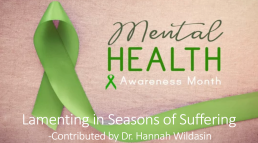
Recent, tragic events against the backdrop of a global pandemic have left many struggling with mental and emotional pain. Ten people were killed in a racially motivated hate crime in Buffalo, New York. Their friends, families, and extended communities are grieving the loss of innocent lives. Some are likely experiencing trauma symptoms, which could include fear, anxiety, helplessness, confusion, sadness, difficulty concentrating, nightmares, irritability, anger, and withdrawing or isolating.
In the past few months, five NCAA student-athletes—Katie Meyer, Jayden Hill, Robert Martin, Sarah Shulze, and Lauren Bernett—died by suicide, devastating their loved ones, teammates, and coaches. Sadly, they are not the only ones who have struggled to the point of thinking there was no other way to find relief as suicide is the second leading cause of death for 10-14- and 25–34-year-olds (CDC, 2022).
In a recent survey by The Ohio State University Office of the Chief Wellness Officer and College of Nursing, 66% of working parents reported burnout, a result of “chronic stress and exhaustion… that overwhelm a parent’s ability to cope and function,” during the pandemic (Melnyk & Lusk, 2022, p. 3). This has led to increased alcohol use and increased symptoms of anxiety and depression.
In our churches, our pastors are struggling. In 2021, 38% of pastors reported considering quitting full-time ministry and only 1 in 3 met criteria for health in terms of physical, emotional, relational, spiritual, vocational, and spiritual well-being (Barna, 2022).
Sadly, there are more examples of struggles many are currently facing than are included above. It is important to acknowledge and respond to emotions in healthy ways. God can handle our questions and our pain. One helpful practice when walking through a season of suffering is writing a lament or a series of laments. There are examples in Scripture than can serve as templates. David, a man known for his love for God, models this in Psalm 13:1-6:

It takes strength and humility to acknowledge when you are struggling. If you need professional help, you are not alone—1 in 5 adults struggle with mental illness every year (NAMI, 2022). Please feel free to reach out to Missio Seminary’s Graduate School of Counseling for information on Christian counselors in your area via email at GSOC@missio.edu. If you or someone you know is contemplating suicide, please call the National Suicide Prevention Lifeline at 800-273-TALK (8255).
References
Barna. (2022). The State of Pastors. https://www.barna.com/research/pastors-well-being/
CDC. (2022). Preventing Suicide. https://www.cdc.gov/suicide/pdf/NCIPC-Suicide-FactSheet.pdf
Melnyk, B. M., & Lusk, P. (2022). A Practical Guide to Child and Adolescent Mental Health Screening, Evidence-Based Assessment, Intervention, and Health Promotion (3rd ed.). National Association of Pediatric Nurse Practitioners and Springer Publishing Company https://wellness.osu.edu/sites/default/files/documents/2022/05/OCWO_ParentalBurnout_3674200_Report_FINAL.pdf
National Alliance on Mental Illness. (2022). Mental Illness Awareness Week. https://www.nami.org/Get-Involved/Awareness-Events/Mental-Illness-Awareness-Week.
1 Comment
Add comment Cancel reply
You must be logged in to post a comment.
This site uses Akismet to reduce spam. Learn how your comment data is processed.

Wonderful web site. Lots of useful info here. I’m sending it to a few friends ans additionally sharing in delicious. And obviously, thanks to your effort!